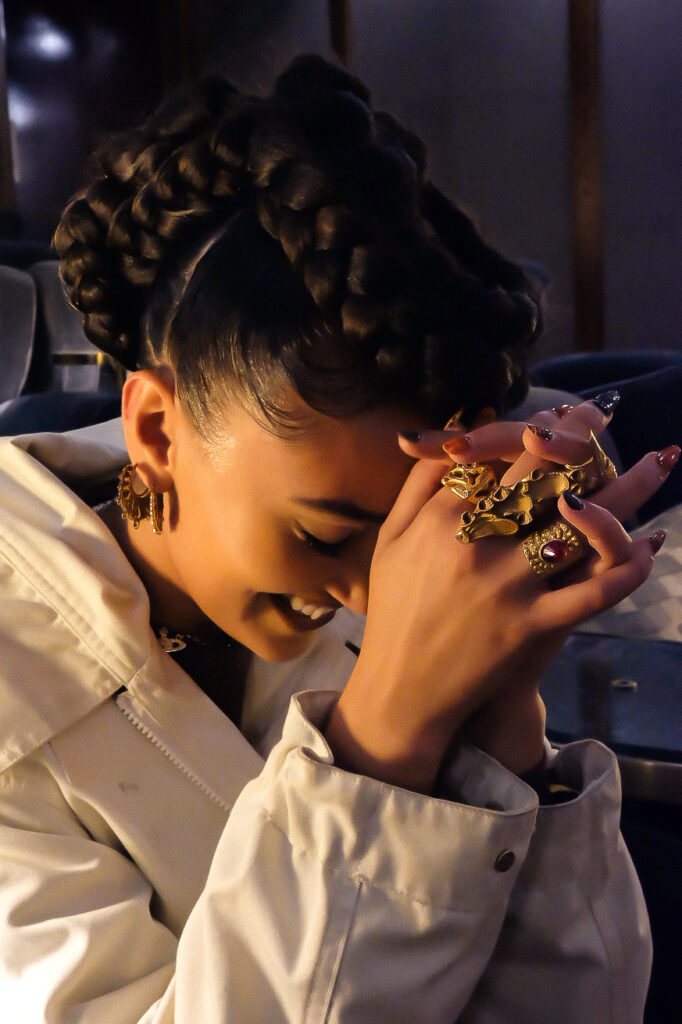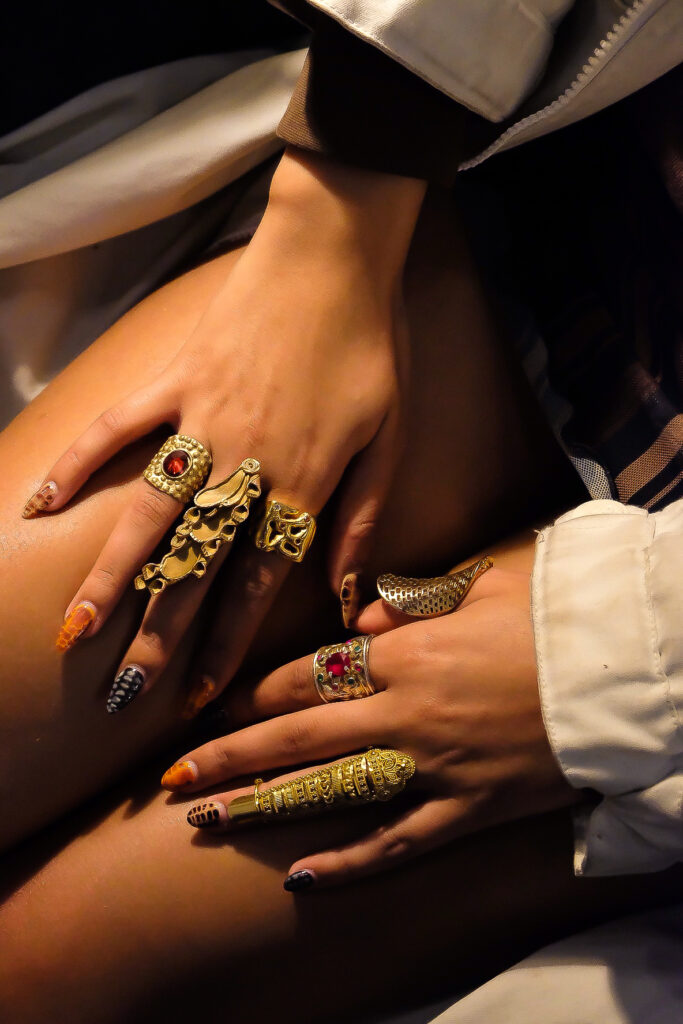‘Fuck all this representation shit’: on her first album, Joy Crookes is telling her own story
With her phenomenal debut album Skin out now, we talk to a long-time gal-dem favourite about vulnerability, representation and music as solace.
Tara Joshi
30 Oct 2021

Naila Tasnim
Joy Crookes is a born storyteller.
In part, the south-east London singer-songwriter says, this is because of her ancestry as the child of an Irish father and a Bangladeshi mother. “My dad used to recite poems to me, recite stories to me. Storytelling becomes a huge part of your culture when you have to immortalise your memories – when you have to archive your own history because of erasure through 800 years of British colonisation.”
Joy does not sugarcoat what she wants to say. She is relaxed but tired when we meet, lounging improbably in an empty cinema in West London before our shoot, chunky boots propped up on a footstool. Her glossy brown hair is tightly coiled in a braided bun, eyes gazing into the distance through impossibly-long lashes and her skin glowing and dewy like the myriad gold rings that embellish her hands. “I love buying and looking at jewellery, going to Green Street, Alperton and Brixton”, she lists off.
“When you have that kind of history in your bloodline, it either makes you the sort of person who’s complicit, or the sort of person that itches to fucking say something. And I think that I’ve got the itch”
The press cycle for Joy’s debut album, Skin, is keeping her busy – on the day of our interview, it is less than two weeks until the record lands, but she’s been gigging relentlessly and is making a TV appearance later that night. Still, she is generous with her conversation, talking abundantly through everything from adolescent anecdotes to recent tales of regrettable tattoos and aunties and uncles in Elephant and Castle (“to me, my heritage is everyone who was involved in my upbringing”). We discuss her love for poets like Seamus Heaney and Sylvia Plath, why Manara is her favourite DJ (incidentally, a correct take), the joys of sex, going to the movies, the link between autoimmune diseases and intergenerational colonial trauma.
“When you have that kind of history in your bloodline,” she says, “It either makes you the sort of person who’s complicit, or the sort of person that itches to fucking say something. And I think that I’ve got the itch – not necessarily in an ‘activism’ way, but like my mum and my dad, I can’t keep my mouth shut.”
On Skin, Joy’s ability to weave a tale takes centre stage, with her rich, smooth vocals meeting rich, smooth production. It is a deeply personal work – the album takes its name from a poem she found in a box of memories her dad keeps. Threading together family, trauma, gentrification, social media activism, sex and love, it is unflinching in its honesty – something I suggest she must be getting used to, given that 23-year-old Joy has been making songs that reverberate and echo with vulnerabiity for around ten years now (she started writing music aged 12, putting original songs on her YouTube when she was 15).
“You get more used to it, but it doesn’t get less scary,” she says, “And then what happens with songs is, life makes them have more meanings. When you write about something so personal, even though a line might be specific to something you wrote about, it starts to mean loads of other things.”
In general this is how Joy speaks: open, reflective, perceptive. To illustrate her point, she namechecks album track ‘To Lose Someone’, a slow burner with cascades of strings and piano which opens with a recording of her mother speaking in a blend of Bangla and English about heartbreak. “When I wrote that, I hadn’t lost anyone,” Joy explains, “I was writing about losing a part of myself – and not in a negative way – in order to love someone else. How, whenever you start a new relationship or a new love, there is a part of you that has to decide if you’re ready to take that on, and what you’re willing to lose in order to love – and accepting that when you love someone, you will inevitably lose that person, be that through death, a break-up, a fall-out.”
By the time Joy was recording the vocals to the song, however, it was two weeks after a long-term relationship ending. “I was fucking broken,” she says now, “I was almost blubbing on the mic. In that way, the song had a whole new meaning – and that’s scary, that songs are so powerful. Those three and a half minutes of a song that you wrote when you were 15, 18, 21, can have a whole new meaning depending on where your life takes you as a person. It makes me realise that music is magic, and sometimes your subconscious speaks before you do.”
“Music breaks down barriers and borders and boundaries. It’s the best feeling in the whole world, to know that you’re not the only person in the world going through something”
She talks a lot about music as solace and a universal language of comfort. “Music breaks down barriers and borders and boundaries,” she says, “It’s the best feeling in the whole world, to know that you’re not the only person in the world going through something. Be that joy, the saddest fucking shit in your life, be that a really specific thing – for me, solace has always gotten me through that. It amazes me that music can do that.”
Joy’s music offers that solace to her listeners, too. As a statement of who she is, Skin rings raw and beautiful, aching with sentiments that feel personal but universal all at once. Take ‘19th Floor’, a rumination on gentrification in her hometown of Elephant and Castle, while also a love letter to her nani (her maternal grandmother). The opening voicenote hears her telling her nani she loves her, as you hear a lift door closing.
“The 19th floor is the floor my grandma has lived on for 30 years,” Joy explains now, “It’s the reason my family are in this country, that was the first footprint. It’s important for me to add that context [with the voicenote] on a completely practical level because I can’t just assume everyone will know what I’m talking about. But what that does is make it a more emotional journey, because it’s not hiding anything. It’s literally the truth, I leave my grandma’s yard after being full up from lamb and aubergine and rice, and I tell her I love her when I get in the lift. And there’s that weird thing that whenever you say goodbye to one of your grandparents, it always feels like it might be the last time. So the moment I say goodbye feels special.”
The record itself feels very special. The visuals have cleverly played with perceptions – in the soaring ‘Feet Don’t Fail Me Now’, for instance, she sits astride a motorbike in a white sari, traditionally worn by South Asian widows who are often still asked to give up most pleasures in life once their husbands have died. Joy’s work sits in opposition to the kind of restrained, submissive depictions we still often see of South Asian women: instead, it is rich and abundant, gentle but powerful, comfortable to self-critique and ruminate on her missteps and things that are taboo.
“There’s literally a lyric that goes, ‘Only in the bedroom light, fucking eye to eye’” she laughs, when I mention that it’s still relatively rare that you hear women in our communities talking about sex as pleasure, “It’s just a thing we all do, might as well talk about it! Sex is important, and not being ashamed of sexuality and our bodies is important.”
Joy likes to skewer expectations of her. She rolls her eyes at racially coded genres, and is far more enthusiastic when we talk about Alex Turner’s soundtrack for the 2011 movie Submarine (“that’s one of my favourite films!”) – she lights up when I say the Last Shadow Puppets era of alternative British music reminds me of her sound too, with its classic, cinematic sound. Joy is also bored of conversations about race because the album title was never really a reference to that: “Skin is protection and societal weakness, and is also reference to the poem my dad wrote – so if people take it at face value [as being just about race], and don’t delve into it, then that’s fucking hilarious because all it does is prove my point. It’s the same way that every day people make assumptions about us based on our skin – but actually what else is behind that?”
“Representation is beyond skin colour! It’s someone expressing themselves how you wanna express yourself, saying what you wanna say”
She is understandably reticent too, to play into being any kind of ‘voice’ for the South Asian community: “[‘Representation’] is the joke that keeps on giving,” she says, “South Asia is massive, you know, I could never represent all of that. We’re complex, as a society and a civilization – we’re different complexions, different sexualities, different genders. We’re all doing our own thing, people like Priya Ragu and Nayana IZ are coming through and representing the multi-faceted nature of our community. I’m looking forward to seeing that space continue to open up and not be trope-y. But there’s only so much I can do – and to be honest with you, I’m just trying to represent myself.”
At the time of writing, Skin has made it into the charts as one of the UK’s top 5 albums – no mean feat considering Joy’s release day competitors were little-known acts such as Coldplay, the Beatles, plus everyone streaming old Adele albums again ahead of 30. It must seem strange given that a younger Joy had never really thought a career in music would be feasible. The journey has been incremental, and she laughs remembering her early emails to gal-dem as an 18-year-old, asking for coverage (needless to say, we were very happy to oblige).
What would she say to her younger self now? “I would tell my 12-year-old self, last night you went to dinner with Kate Nash,” she smiles, “And she was your fucking hero, but now you call her your friend, and you have done for a minute. That’s no name drop – that is the most mind-blowing shit to me, ever. I used to bring fucking photos of her to hairdressers! I started wearing dresses because of her!”
Joy continues, an exuberant, outspoken storyteller as ever, “Fuck all this representation shit – representation is beyond skin colour! It’s someone expressing themselves how you wanna express yourself, saying what you wanna say – Kate Nash was that for me. I was obsessed! So I wouldn’t give my inner-child advice, I’d just tell her ‘this is what’s gonna happen, baby girl’ and she’d be like ‘nah, you’re fucking joking!’”
You get the feeling baby girl might need to strap in for the next while. On the basis of how special and warming Skin feels, this is only the beginning.
Joy Crookes’ debut album ‘Skin’ is out now on Insanity Records. You can listen and buy here.













